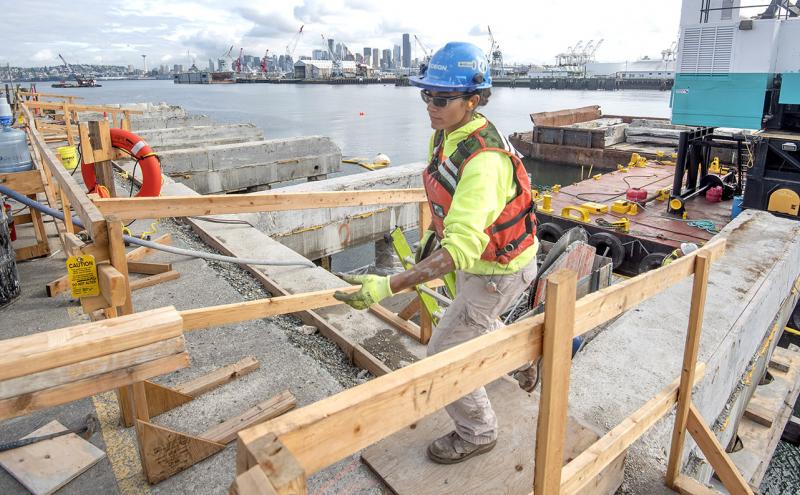
As our region continues to recover from the economic impacts of COVID-19, low-income workers, youth from disadvantaged communities, and those without a post-secondary education or training face significant barriers in accessing living-wage jobs.
The Port of Seattle is committed to creating career pathways by growing living-wage jobs, building connections to job training, removing barriers, and expanding opportunities for the people and communities left behind in our growing economy.
One way the Port supports equitable access to well-paying jobs is through its Priority Hire Program. Since the City of Seattle enacted a Priority Hire ordinance in 2015, several regional public agencies including the Port have since adopted their own Priority Hire programs.
With this program, the Port is focused on providing family wage jobs to qualified construction workers living in economically distressed communities, leading to economic growth and job creation across the region. The Port also prioritizes recruiting and retaining women and people of color to pursue careers in construction, continuing to improve and target resources to those who lack economic opportunity.
Here are a few accomplishments in 2021:
1. Construction apprentices exceeded Port goals for hours worked on capital projects
In 2021, construction apprentices performed over 21.5 % of labor hours on Port projects. This number exceeded the Port goal for apprentices to perform at least 15% of all contract labor hours for construction contracts $1 million in value or greater.
Apprentices working on Port construction contracts include:
- 9.9% women apprentices
- 32.4% people of color apprentices
To help remove barriers for underrepresented communities seeking to enter the construction industry, the Port partners with regional government agencies, construction trade unions, contractors, and training institutions to develop programs that advance training and placement of apprentices, and establish hiring goals for the number of apprentices, local apprentices, and women and people of color on construction contracts of $1 million or more.
2. Apprentices worked 231,775 hours on 40 Port construction projects
- 592 apprentices earned $9.3 million in wages and benefits on Port construction projects
Apprenticeship and pre-apprenticeship programs play a key role both in providing fair access to living-wage construction jobs and supplying enough trained and capable workers to meet construction needs of the Port and other public and private projects.
The Port contracts with community-based organizations like ANEW and the Urban League of Metropolitan Seattle, in partnership with the City of Seattle and Sound Transit, to provide outreach, training, and retention services to help residents of economically distressed communities, people of color, and women already working in construction to stay working and advance their careers.
3. Workers from economically disadvantaged zip codes exceeded the goals for hours worked on capital projects
In 2021, Priority Hire workers performed 25.3% of contract labor hours on Port capital projects. This exceeded the Port’s goal for at least 20% of all contract labor hours to be performed annually by Priority Hire workers.
- 99 Priority Hire workers earned nearly $770,000 in wages and benefits on Port projects
The local construction industry has boomed since the Port launched its Priority Hire program in 2020. While the pandemic slowed construction in 2021, residents living in local, economically disadvantaged areas are working more hours on construction projects than in the previous years.
4. The Port continues to address barriers to entry into well-paying construction careers
The Port and partners work to address racial, gender, and economic disparities through a well-coordinated support system to help workers connect to training, counseling, basic needs assistance, job search and placement, and continued support in the workplace and at home.
The Port focuses on the entire worker development process — from recruitment to pre-apprenticeship training to job placement and referrals into construction careers — to create economic opportunities that remedy racial and social inequities and invest tax dollars back into local communities.
To address language and cultural barriers to the construction industry, the Port offers recruitment events, training, mentoring, professional networking, as well as work placement and experience opportunities which can smooth entry, retention, and progression within the construction industry.
Moving forward, the Port will work to support communities furthest from opportunity by addressing the following ongoing challenges:
- Ensuring women, people of color, and economically disadvantaged workers benefit from Port equity goals
- Exploring more ways to help workers succeed in apprenticeships, including financial assistance, tools or work gear, case management, or informal mentorship
- Exploring enforcement of Acceptable Work Site standards on Port projects to prevent workplace harassment
- Identifying better strategies to help people of color and women stay in construction careers
- Using enhanced data analytics and dashboards to learn more about the Priority Hire and Apprenticeship Programs and participants
- Exploring the addition of aspirational goals for women and workers of color for the Priority Hire program, customizing goals for individual projects, and increasing overall program goals to grow community impact








